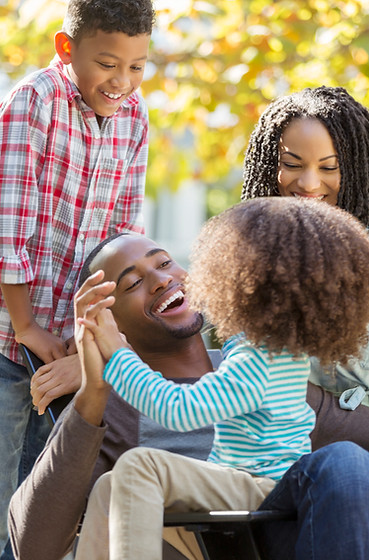
Navigating dating and relationships after a cancer diagnosis
A cancer diagnosis affects more than just the body - it deeply impacts mental health. Understanding the connection between cancer and depression is the first step to finding support and healing.
What you'll learn by reading this page:
Navigating dating and relationships after cancer
Challenges and tips on dealing with relationships after cancer
The importance of therapy for managing relationships after cancer
Navigating dating and relationships after cancer
Dating and forming relationships after a cancer diagnosis and treatment can be both challenging and rewarding. Survivors often face unique emotional and physical hurdles that can make the prospect of dating seem daunting. However, with self-compassion, patience, and open communication, it's possible to navigate these challenges and find meaningful connections. Understanding and embracing your journey is key to building confidence and fostering healthy relationships post-cancer.
Struggling with confidence and relationships?
Join our program for resources, guidance, and a community that understands the challenges of relationships after cancer.
"You and the people around you are influenced by the cancer experience- before, during, and after treatment. Acceptance and adjustment are important no matter where you find yourself with your cancer experience. Even post cancer treatment there is an adjustment to becoming a couple again."
Dr. Tommy Bischoff,
Therapist at The After Cancer
Relationships after cancer
Impact on existing relationships
Cancer can have a profound impact on existing relationships, including marriages and long-term partnerships. The stress of a diagnosis, coupled with the rigors of treatment, can strain even the strongest bonds. However, many couples find that they emerge from this experience with a deeper connection, having faced the challenges together. Communication is key during this time, as is allowing space for both partners to express their feelings and fears. The journey through cancer can ultimately strengthen a relationship, bringing partners closer as they navigate this difficult path together.
Marriage after cancer treatment
After cancer treatment, couples often face a new set of challenges, including dealing with the fear of recurrence and adjusting to changes in physical health. These adjustments may involve redefining roles within the relationship or finding new ways to support each other. Open communication is essential in addressing these changes and ensuring that both partners feel understood and valued. Couples may also benefit from counseling, where they can explore these challenges in a supportive environment and learn strategies for maintaining a strong relationship.
Dating after cancer treatment
Life after cancer treatment often involves adjusting to a "new normal," which can include changes in energy levels, physical abilities, and overall outlook on life. When it comes to dating, these changes may affect how you approach relationships. It’s important to be patient with yourself and recognize that it’s okay to set boundaries that reflect your current needs and capabilities. Potential partners who are understanding and supportive will appreciate your honesty and respect your journey. As you adjust to this new phase of life, you’ll find that dating can still be a fulfilling and positive experience.
“Cancer doesn't just affect the patient; it impacts the entire family, especially marriages. Studies show that the stress of dealing with a life-threatening illness can strain even the strongest relationships. For women, the risk of divorce or separation is significantly higher when they are the affected partner. This statistic was daunting, but it motivated us to do something about it.”

Tracy Binder,
Brain cancer patient
When and how to disclosure your cancer history?
Deciding when and how to disclose your cancer history to a potential partner is a deeply personal decision. It’s important to choose a moment when you feel comfortable and have established a level of trust. Honesty is crucial, but it’s also important to set the right tone. Focus on how you’ve grown from the experience and what you’ve learned, rather than framing it as a burden. This approach can help your partner understand your journey and appreciate the strength it has given you.
Dating and forming relationships after cancer is a journey that requires patience, understanding, and above all, self-love. It's crucial to give yourself the time and space to heal emotionally and physically, while also recognizing your worth. As you re-enter the dating world or strengthen existing bonds, focus on relationships that bring positivity and genuine support into your life. Remember, the right connections will honor your experiences and contribute to your well-being. Embrace the process with compassion for yourself, and seek out relationships that uplift and empower you as you move forward in this new chapter.
Struggling with confidence and relationships?
Join our program for access to personalized guidance.
"The way I see myself changed a lot after treatment. The physical changes made me even more insecure than I was before, and all that made me pretty unstable emotionally. Reaching out for professional help was one of the best decisions I did, loving myself comes first, and we need to know how to love ourselves before letting others love us."
Cancer survivor,
Member of The After Cancer
Challenges of dating after cancer
Emotional and psychological impact
The emotional challenges of dating after cancer are significant. Survivors may grapple with body image concerns, fearing that the physical changes brought on by treatment might make them less attractive to potential partners. This fear can be compounded by the psychological effects of a cancer diagnosis, which can leave lasting impacts on self-esteem and confidence. Survivors might also worry about being rejected due to their health history, leading to anxiety and hesitance in pursuing new relationships.
Beyond these concerns, survivors often struggle with feelings of vulnerability, as they may worry about burdening a new partner with the realities of their health situation. The fear of recurrence can also cast a shadow over new relationships, making it difficult to fully invest emotionally. These emotional hurdles require time and self-reflection to overcome, but with support, many find that they can move forward and embrace new opportunities for love.


Physical changes and intimacy
Cancer treatments, such as surgeries, chemotherapy, and radiation, can lead to significant physical changes that affect intimacy and self-confidence. For example, survivors of breast cancer may have undergone mastectomies, leading to changes in body shape that can impact how they view themselves and how they believe others perceive them. Similarly, treatments like prostate surgery can lead to sexual health issues, affecting a survivor's ability to engage in intimate relationships.
Other physical changes might include weight fluctuations, scarring, hair loss, or fatigue, all of which can influence a survivor's body image and comfort with physical intimacy. These changes can create barriers to intimacy, making it important for survivors to communicate openly with their partners and seek professional guidance when needed. Specialized therapy, including sexual health counseling, can be invaluable in helping survivors and their partners navigate these changes and maintain a healthy and fulfilling intimate life.
"Having pelvic pain can stress your marital relationships, place a strain on your mental health and even put you in a space of depressed mood. It can cause anxiety because you are not sure when it will return or you know exactly how it will return ie. in the bedroom. This is by far when enough is enough. It has been plaguing you for a long time but when you can no longer have intercourse with your partner and your intimacy has continued to plummet you have to do something about your pelvic pain NOW!!!"

Dr. Katrina Heath
Pelvic Floor Physical Therapist
Tips for dating after cancer
Acknowledge Your Journey
-
Reflect on Your Strength: Recognize the strength and resilience you’ve demonstrated throughout your cancer journey. Surviving and recovering from cancer is a testament to your courage, and acknowledging this can be a powerful confidence booster.
-
Embrace Your Story: Understand that your experience has shaped who you are today. Rather than seeing your cancer history as a liability, view it as a part of your unique story that has contributed to your growth.
Focus on Self-Care
-
Prioritize Your Well-being: Engage in activities that promote your physical, emotional, and mental health. This could include regular exercise, a balanced diet, and practices like meditation or yoga, which can help you feel more centered and confident in your body.
-
Pamper Yourself: Take time to indulge in activities that make you feel good about yourself. Whether it’s getting a new haircut, updating your wardrobe, or simply spending time doing something you love, these small acts of self-care can boost your self-esteem.
Rebuild Your Body Image
-
Embrace Your Body: It’s important to come to terms with any physical changes resulting from your treatment. Focus on what your body has endured and overcome, rather than how it may have changed. Celebrate your scars as symbols of survival.
-
Positive Affirmations: Practice positive self-talk. Remind yourself daily that you are worthy, attractive, and deserving of love, regardless of the physical changes you may have undergone.
Take Small Steps
-
Ease into Social Situations: Start by engaging in low-pressure social activities to rebuild your comfort level in social settings. This could be spending time with close friends or joining group activities where you can meet new people in a relaxed environment.
-
Gradual Exposure: If the idea of dating feels overwhelming, take it slow. Begin with casual, low-stakes interactions, such as online dating or group outings, to gradually build your confidence before moving on to one-on-one dates.
Building confidence for dating after cancer involves a combination of self-care, mental resilience, and embracing your journey.
Connect with Support Networks
-
Join Support Groups: Surround yourself with others who have been through similar experiences. Support groups, both in-person and online, can provide a space to share feelings, gain encouragement, and exchange advice on dating and relationships.
-
Seek Professional Guidance: If you’re struggling with body image, self-esteem, or emotional challenges, consider working with a therapist or counselor. They can help you develop strategies to build confidence and navigate dating post-cancer.
Practice Open Communication
-
Be Honest About Your Needs: In dating, it’s essential to communicate openly about your experiences and what you’re looking for in a relationship. Being upfront about your health history at a time that feels right can help alleviate anxiety and build trust.
-
Set Boundaries: Understand your limits and be clear about them with potential partners. Whether it’s taking things slow or needing more emotional support, setting boundaries ensures that you feel safe and respected.
Celebrate small wins
-
Acknowledge Progress: Recognize and celebrate the small victories along the way, whether it’s going on a first date, having a meaningful conversation, or feeling comfortable in your skin. Each step forward is an achievement.
-
Reflect on Positive Experiences: Keep a journal or simply take time to reflect on positive interactions and experiences. This can help reinforce your confidence and remind you of your progress.
Visualize Success
-
Positive Visualization: Spend time visualizing yourself successfully navigating dating situations. Picture yourself confident, engaging, and enjoying the experience. This can help prepare your mind for positive outcomes.
-
Affirm Your Desirability: Remind yourself regularly that you are deserving of love, companionship, and happiness. This mindset will help you approach dating with confidence and openness.
By integrating these strategies, you can gradually rebuild your confidence and approach dating with a sense of empowerment and self-assurance. Remember that confidence is a journey, and it’s okay to take it one step at a time.
















